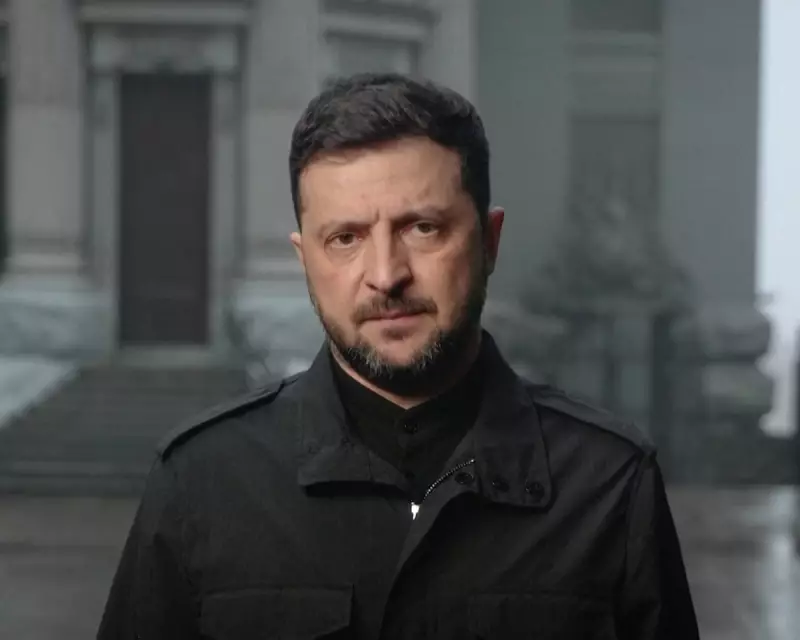
Ukrainian President Volodymyr Zelenskyy has declared his nation faces one of its most challenging periods in history as former US President Donald Trump intensifies pressure on Kyiv to accept a controversial peace agreement within days.
The Ultimatum and Ukraine's Dilemma
In a sobering address delivered outside his presidential palace, Zelenskyy revealed that Ukraine confronts an impossible decision: maintain national dignity or risk alienating a crucial ally. Trump has set Thanksgiving Day in the United States as the deadline for Ukraine to sign the US-backed proposal, which European and Ukrainian officials have condemned as amounting to capitulation.
The Ukrainian leader described the current pressure as among the most intense his country has faced since Russia's full-scale invasion began nearly four years ago. He outlined two stark paths forward: accepting Trump's 28-point proposal or enduring an exceptionally difficult winter, with Russia having already devastated much of Ukraine's energy infrastructure, leaving millions without heating or electricity.
Details of the Controversial Peace Plan
The proposed agreement, which has sparked outrage in Ukrainian political circles, demands significant concessions from Kyiv. Ukraine would be required to surrender the eastern Donbas region, including territories it currently controls, and substantially reduce its military size. The plan explicitly prohibits European peacekeeping forces and mandates that Ukraine relinquish long-range weaponry while abandoning its ambition to join NATO.
Zelenskyy warned that agreeing to these terms could leave Ukraine "without freedom, dignity and justice". He emphasised the danger of trusting "someone who has already attacked us twice" and vowed never to compromise Ukraine's fundamental interests or violate its constitution. "We did not betray Ukraine then [in 2022], and we will not do so now," he declared firmly.
International Reactions and Diplomatic Maneuvering
European leaders have united in opposition to Trump's proposal, with Western allies including French President Emmanuel Macron, German Chancellor Friedrich Merz, and British Prime Minister Keir Starmer expressing solidarity with Zelenskyy during coordinated calls on Friday. They reaffirmed their support for Kyiv and insisted that any peace agreement must be genuinely fair and respect Ukraine's established boundaries.
In contrast to Trump's plan, which demands Ukraine abandon several major cities, European leaders proposed that the current line of contact should serve as the starting point for territorial discussions. British Prime Minister Starmer emphasised that "the principle that Ukraine must determine its future under its sovereignty is a fundamental principle" while advocating for a just and lasting peace.
The European Union's foreign policy chief Kaja Kallas issued a stark warning about the global implications, stating that a peace deal rewarding invasion would establish a "very dangerous" precedent. "If you just give in to the aggression, then you invite more aggression," she cautioned, suggesting other nations might develop territorial ambitions against their neighbours.
Meanwhile, Trump defended his position during a Fox radio appearance, asserting that Thursday represented an appropriate timeframe for Zelenskyy to sign the agreement and expressing doubt about Ukraine's ability to prevent Russian forces from seizing Donbas territories militarily. US officials indicated the president is pursuing an aggressive timeline to conclude the conflict and plans to exert unprecedented pressure on Kyiv.
Behind the Scenes Negotiations and Future Prospects
The controversial 28-point plan emerged from discussions between Vladimir Putin's envoy Kirill Dmitriev and Trump's special representative Steve Witkoff during meetings in Miami, notably excluding European and Ukrainian input. Despite this, Zelenskyy has committed to working constructively with Washington, offering alternatives while protecting national interests.
In a significant development, Zelenskyy held an hour-long telephone conversation with US Vice-President JD Vance, who has previously urged Ukraine to negotiate with Russia to swiftly end the war. Following their discussion, Zelenskyy issued a cautious statement indicating they had covered numerous details of the American proposal and were working toward a dignified path forward for achieving lasting peace.
Both nations have appointed their national security advisers to continue negotiations on the draft peace plan's text. A delegation of senior US military officials led by Army Secretary Dan Driscoll, whom Trump has designated as his newest special representative, held talks with Zelenskyy in Kyiv on Thursday. American sources suggest this group will likely travel to Moscow next week to discuss the proposal with Kremlin officials.
Russian President Vladimir Putin confirmed Moscow had received a copy of the US plan, which he said could "lay the foundation" for ending the war. However, sources close to the Kremlin indicated that while Putin approved the proposal's overall contours, it fell short of other Russian demands, including legally binding guarantees against NATO expansion and enshrining Ukraine's neutral status in its constitution.
As the deadline approaches, Zelenskyy acknowledged the immense pressure facing his nation, noting that "our people really, really want this war to end". He offered a poignant metaphor for Ukraine's situation: "We are, of course, strong, but even the strongest metal can break. Don't forget that." The coming days will determine whether Ukraine accepts what many consider a surrender or risks confronting both Russian aggression and American opposition simultaneously.





